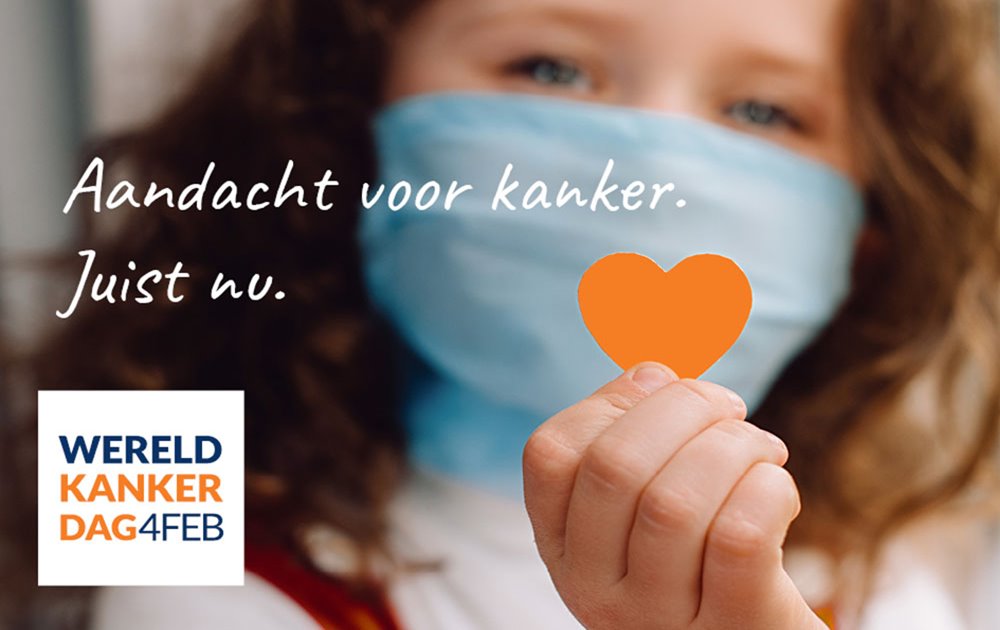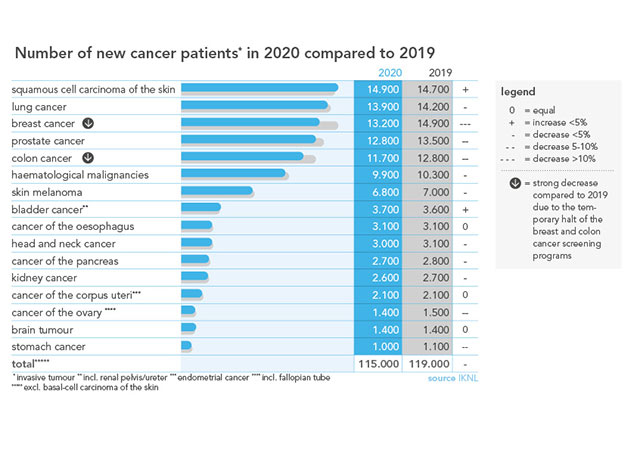
Fewer cancer diagnoses in 2020 due to COVID-19 crisis in the Netherlands: first decrease in thirty years
115.000 patients* were diagnosed with cancer in 2020, a decrease of 4.000 diagnoses compared to 2019. This decrease is caused by the postponement of doctor’s visits, the temporary halt of screening programs, and the downscaling of healthcare services last spring due to the COVID-19 crisis. The decrease in cancer diagnoses is the first decline since the establishment of the Netherlands Cancer Registry (NCR) in 1989. The decline in cancer diagnoses was observed across all cancer sites; however, it was most pronounced for breast, colo, and prostate cancer. These findings derive from data from the NCR and are presented by the Netherlands Comprehensive Cancer Organisation (IKNL) at the occasion of the annual World Cancer Day on February 4, 2021.
Between March 2020 and May 2020, approximately 25% fewer cancer diagnoses were made than in the same period in 2019. The steady decrease in the need for critical COVID-19 care in the Netherlands since early April opened the way to restart various regular health care services, including cancer screening programs. As a result, the accrued backlog of cancer diagnoses was largely cleared during the fall. At the end of 2020, there was an overall accrued backlog of 4,000 (3.5%) cancer diagnoses compared to 2019. The backlog was the largest for breast cancer. The screening program's temporary halt primarily caused a substantial decrease in breast cancer diagnoses among age groups eligible for such programs. The number of colon cancer diagnoses has decreased for several years, owing to early detection in the screening program. This trend, along with the COVID-19 crisis, explains the lower number of colon cancer diagnoses in 2020 than in previous years.

Skin cancer
Over the past years, skin cancer dominates as the most common type of cancer in the Netherlands. In 2020, almost 6.800 skin melanomas were diagnosed in the Netherlands as well as almost 15.000 squamous cell carcinomas—which rarely metastasises. Due to the population's ageing and increased UV exposure from the sun and tanning beds, skin cancer's annual incidence is rapidly increasing. Despite the COVID-19 crisis, there was a small increase in squamous cell carcinoma diagnoses in 2020. Lung cancer was the second most-diagnosed type of cancer in the Netherlands in 2020, with almost 14.000 new cases. The number of lung cancer cases remains high, with most cases directly attributable to smoking. In 2019, breast cancer was the second most-diagnosed type of cancer. However, due to the substantial decrease in the number of diagnoses in 2020, breast cancer currently holds the third position in the list of most frequently diagnosed type of cancers in the Netherlands, with 13.200 new diagnoses in 2020. Prostate cancer takes the fourth place (12.800) and colon cancer the fifth place (11.700). Other common types of cancer include haematological malignancies (9.900), bladder cancer (3.700 invasive tumours, including renal pelvis/ureter), head and neck cancer (3.000), as well as oesophageal, pancreatic, and kidney cancer.
*Invasive tumours excluding basal-cell carcinoma of the skin, a very common but not life-threatening type of cancer (65.000 in 2019 and 55.000 in 2020)
The elderly
Cancer is most frequently diagnosed among the elderly. More specifically, approximately one-third of patients were age 75 or above at diagnosis and approximately 40% of patients were aged 60-75 years at diagnosis. Six percent of all newly diagnosed malignancies were diagnosed in patients age 45 or below. Overall, there was no backlog of cases in 2020 among the latter age group. However, it must be mentioned that there was a decline in cancer diagnoses among this age group during the early stages of the COVID-19 epidemic. The accrued backlog is, fortunately enough, fully cleared after the initial decline.
At present, it is not yet possible to assess whether the delay in diagnoses will result in more diagnoses of cancer in an advanced stage. When cancer is diagnosed at an advanced stage, the outcome for patients is generally worse because more aggressive treatment strategies are required, which, in turn, may reduce the quality of life and survival chances. Research with more detailed data from the Netherlands Cancer Registry is ongoing to assess whether a shift towards a higher disease stage has occurred. Reports on these issues will follow at a later date. It is also possible that treatment protocols have been altered because of the COVID-19 crisis.
Screening programs
Breast cancer diagnoses experienced the second-largest decrease, with skin cancer diagnoses experiencing the largest decrease of all. The decrease in breast cancer diagnoses is most pronounced in women between ages 50 and 74, the age group invited for the screening program. The decrease in colon cancer diagnoses is also most pronounced in the age group invited to the screening program; women and men between ages 55 and 75.
Stage distribution
Data about the disease stage at diagnosis are only available for breast cancer so far; data for other types of cancer will follow mid-2021. The first data about stage distribution in breast cancer in all ages show that mostly early stage diagnoses have decreased. The number of advanced-stage breast cancer diagnoses has not gone up compared to 2019. From March until May 2020 lower numbers of advanced stage tumours were reported, but soon after regular numbers were reported again.
Effects
Together with pathology database PALGA and Dutch Hospital Data, IKNL is researching the effects of the COVID-19 pandemic on the number of cancer diagnoses and treatments, in consultation with the National Taskforce Oncology and the Dutch Healthcare Authority. Delays in diagnosis could eventually lead to an increase in advanced stage tumours, that require heavier treatment. IKNL is researching, together with other researchers, healthcare professionals and patient representatives, whether that effect will occur and the consequences that will bring for quality of life and chance of survival.
World Cancer Day
Today is World Cancer Day. Health care organisations have opened their online doors for patients and loved ones to find a sympathetic ear, go on a tour or attend a lecture. Check out wereldkankerdag.nl/agenda to find an overview of all online activities organised by regional oncology networks, hospitals, IPSO drop-in centres, health care centres, and patient organisations.
The Netherlands Cancer Registry
Data from the Netherlands Cancer Registry about the number of new cancer diagnoses (incidence), per type of cancer, per age group and per sex can be found at NCR data & figures. The Netherlands Cancer Registry (NCR) is a national data bank with reliable data on all patients with cancers. The Netherlands Comprehensive Cancer Organisation (IKNL) manages this data bank. The data in the NCR is used for scientific research concerning cancer and cancer treatment. This research leads to better cancer treatment and better cancer care. Thus, the data help to improve the quality of care for current and future patients.